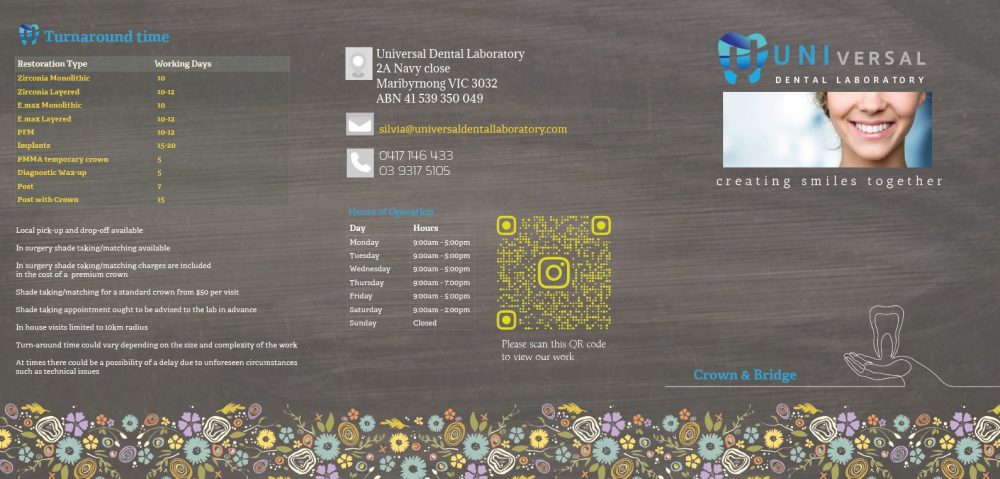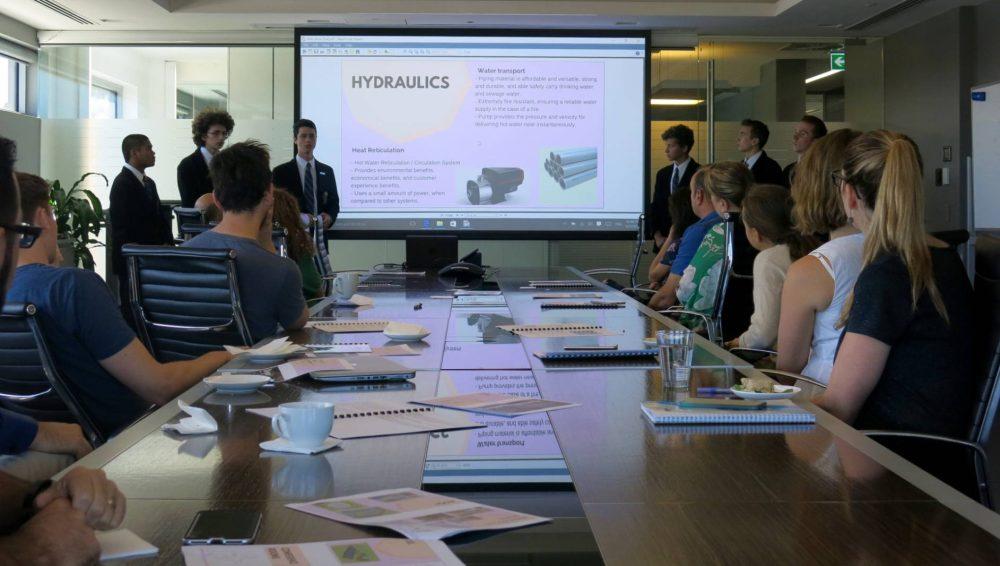
Newsletter
Careers News September 2022
25 February 2022
SBC VS WHITEFRIARS. Year 7 ACC Division 1 Basketball Grand Final.
The Mecca if you will.
The road has come to an end with two teams ready to go to war.
For those of you that are new to the feed, Whitefriars finished on top of the ladder undefeated and showing us why in Round 5 by winning 78-53. That bus ride home created a sense of doubt in the team as we all sat knowing that Friars would be the team waiting in the final.
As the stage was set, a final team huddle grew tight and the words “family” were expressed amongst the team. The team earnt every win throughout the season, they gave up a day on their holidays to train together for the first time. They gave up lunchtimes for meetings and after-schools for practice. They learnt that they could only win if it was together. Underdogs we were and how fitting as we always had nothing to lose but everything to win all season long.
I guess everyone enjoys an underdog including the final scoreboard, as our own St. Bernard’s achieved the unthinkable to most and went home champions.
Whitefriars 45. SBC 46.
I could not be more proud of this team and I hope the way I see the game translates with these up-and-coming athletes for the years to come. Looking back at my junior years of basketball, these experiences are what we remember the most.
A massive shout out to Mr. Aaron Heppell. The man sacrificed his time and put in energy when exhaustion was near. We’ll be hanging up his banner high next to ours, as the Division 2 team were never in doubt of not being crowned Kings. Hep, you’ll always be Essendon’s favourite Heppell.
Winning culture is back and it’s called St. Bernard’s.
Enjoy this moment legends, take it all in and never forget the only thing that feels as good as being champions is going back-to-back. I’ll have to find another spot for the 2023 Premiership Banner…
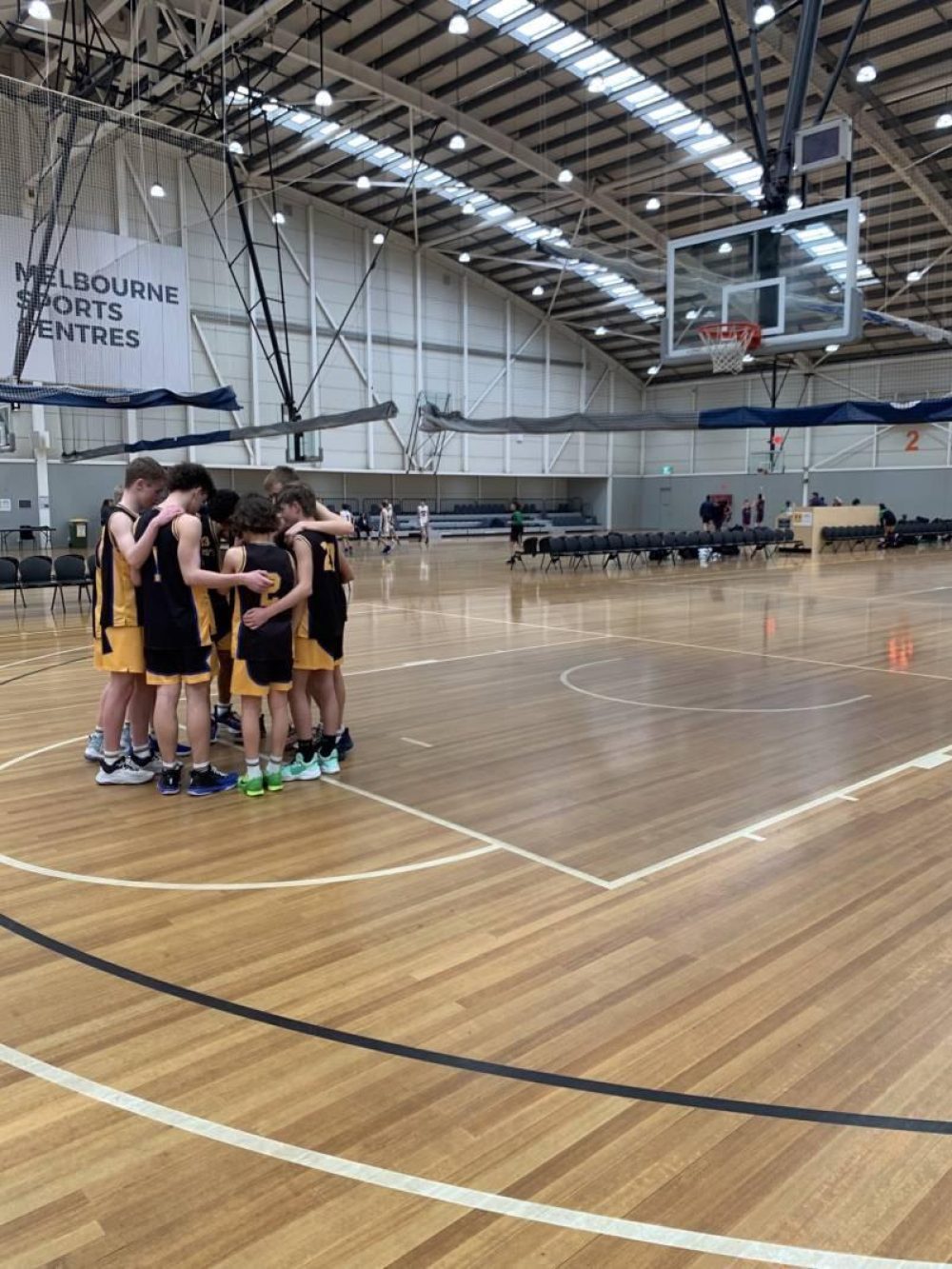

ACC Debating and Public Speaking Competition
Years 9 and 10
Wednesday 17th August 2022
At Mazenod, our Debating and Public Speaking teams competed in the annual ACC competition.
It was a real treat to listen to the various public speaking topics that boys from the twelve different ACC schools chose. From passionate concern for the homeless to the dangers of vaping, students were well-researched, and thoughtful. Out team – Marcus Horvat, Vincent Dong and Xavier Spehar – spoke convincingly about making the lives of indigenous Australians better, and about how we have become increasingly reliant on technology. There was also an impromptu component; boys had just a few minutes to prepare a speech on either ‘Being different is what makes the world a better place’ or ‘My favourite day of the year.’ The responses were often humorous but always entertaining. The public speaking part of the competition was won by Salesian College; congratulations to that team for their well-earned success.
Our debating ACC team, Jakob Glenk, Hayden McDonald, Lucas Ciavarella and Patrick Currie had a very successful day, though narrowly missed out on taking the pennant, placing joint second. Their first debate was on a prepared topic, arguing the affirmative case ‘That employers should adopt a 4-day working week’. After winning that debate, their second debate was on an advised topic, ‘Tourism’ and with fifteen minutes to prepare, they successfully debated the negative, ‘That the state government should subsidise tourism to regional Victoria.’ They went into the afternoon focussed and determined, and prepared the affirmative case for the secret topic, ‘That we should fear the development of Artificial Intelligence.’ Special mention to Patrick Currie who was acknowledged as best speaker for two of the three debates.
There are some very talented speakers at SBC and we look forward to their contributions next year.
The next event will be the Junior ACC Debating and Public Speaking Tournament for Year 7 and 8 students) on Monday 7th November and St Bernard’s College will be hosting.
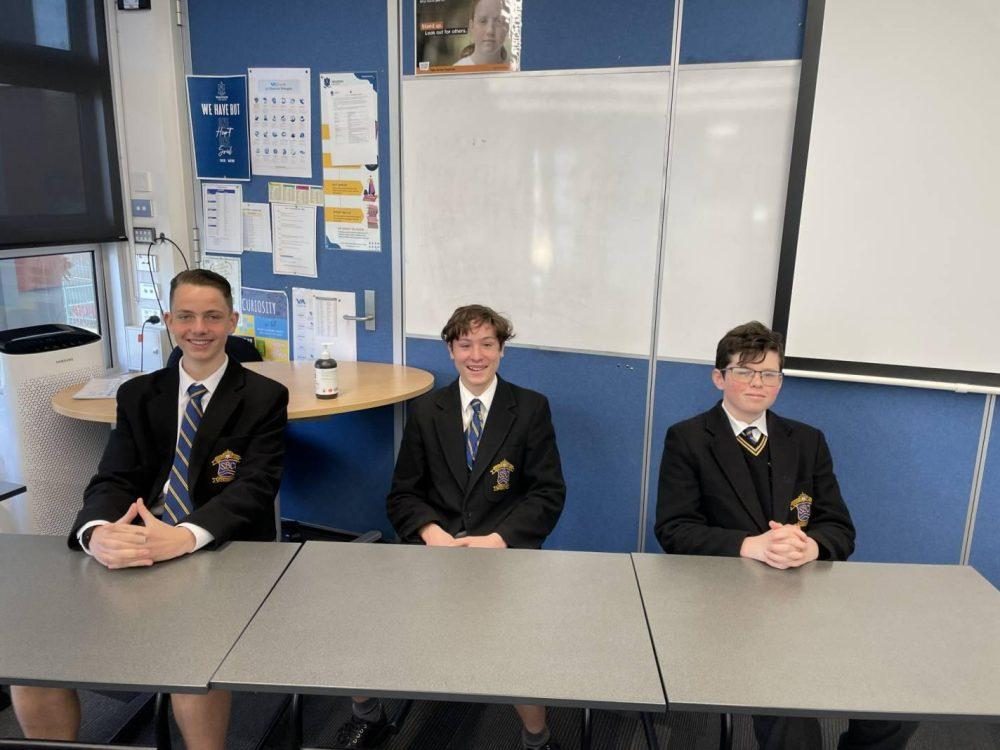
The Library had a tremendous week celebrating Book Week with the students. The response from the students was fantastic, the participation level was very high and the levels of enthusiasm toward the activities, very positive. There were daily Scavenger Hunts, literacy based activities, class spelling bees, Crack the Code Treasure Chest won by Marcus Woolley and Luca Ciavarella and the SBC prize auction. The boys had a lot of fun partaking in the activities with a little friendly competition to make it interesting.
The Library Team were fantastic in planning and providing these activities. Well done.
SBC Short story competition
Theme: "The road ahead" This year the challenge is to create a character and/or world that explores what the road ahead will bring. The judges will be excited to read stories from a range of voices and perspectives.
Prizes
Year 7-8 1st: $100 voucher 2nd: $60 voucher 3rd: $40 voucher
Year 9-10 1st: $100 voucher 2nd: $60 voucher 3rd: $40 voucher
Year 11-12 1st: $150 voucher 2nd: $100 voucher 3rd: $50 voucher
Competition closes 7th October

Holiday hours
The Library will be open from Monday 19th to Thursday 22nd Sept from 9am – 3pm (23rd Sept Grand Final public holiday). Students are welcome to come to the Library to study. Year 12 students will need to be proactive in making sure they have bound their notes prior to the holidays as the use of the binding machine is very heavy during this time and students could miss out on having their notes bound if they wait until the holidays to arrange.
What do you do?
I am a consulting Structural Engineer.
Do you enjoy what you do?
Yes, it is very enjoyable to be able to assist in repairing, inspecting or building homes for people.
What does structural engineering involve?
I complete designs utilising various materials and structure for the construction of load bearing frames which are the main support for houses, factories, bridges, etc.
What did you have to study at uni after life at St Bernard’s, in order to do this?
Civil and Infrastructure at RMIT
Was that study helpful?
Yes, it provided an overview on civil engineering and exposed me to the different facets of civil engineering.
What advice would you give a student considering doing tertiary study?
It may be difficult but what is the worse that can happen? A degree such as civil engineering can be utilised in many fields due to the 4 years of training completed.
What skills do you need to do your job?
Problem solving, communication and creativity.
Did you learn anything about your job when you got there, or did you already know it all?!
I felt like I knew nothing when I started at my first job…. It was a very steep learning curve.
What are the greatest challenges you face at work?
Engineering has a lot of pressure with times frames and client demands. It is not always possible to please everyone
What are the greatest rewards in your role?
Being part of the team, which help move into their dream home/repaired property.
Was studying at uni worth it?
Yes, life experience in the city was appreciated.
What interests you most about your work?
I get to go to some of the behind the scenes on some of the coolest places in the world such as the MCG roof, old train lines in Manchester England and earthquake ruins in New Zealand.
What do you enjoy most?
Being able to change the lives of my end clients.
Which parts about your role do you least enjoy?
Writing long reports which are quite theoretical and long winded.
How did you end up working for yourself?
Through time and building relationships, I was able to get work and clients by recommendations and build a client list. In completing good work, the company’s name got around the industry which increased the workload.
How do you hire people for your business?
I have hired people who I know and trust at this point in time.
What does a typical day look like?
Completing critical tasks such as reports, calculations followed by any inspections required and emails to communicate with the end client progress on jobs
What personal qualities and attributes help you in your role/work?
Ability to work hard, time manage and clearly communicate with clients and staff.
What are your stand out memories of life at St Bernard’s College?
The hill walk from the ovals to the old year 7 portables was a HIKE!
If there’s something you could say to your 17 year-old self, what would it be?
Enjoy your teenage life. As Jimmy V said, “If you laugh, you think, and you cry, that's a full day. That's a heck of a day. You do that seven days a week, you're going to have something special.”
Has anyone helped you in your career journey?
Many people. I believe you are the sum of the people that you learn from. I have had the absolute pleasure of working both in Australia and Internationally learning from technical gurus to people who know how to set up a thriving business. To me, relationships are the most important thing in any walk of life.
ACCent on MUSIC
ACC Music Spectacular
Hamer Hall
Arts Centre, Melbourne
7-9pm, September 13th, 2022
Following our most successful combined school concert in 2018, the Associated Catholic Colleges is proud to announce that we will return to Hamer Hall in September this year for our fourth music spectacular, “ACCent on Music”.
This music spectacular will feature the individual and collective musical talents of the thirteen ACC member schools, showcasing a range of ensembles across all year levels. The aim of this concert is to provide an opportunity to showcase the variety and excellence of music programs within the ACC to our school communities and to the general public. It also provides our musicians and singers a potentially once-in-a-lifetime opportunity of performing high calibre works in a world-class concert hall.
A wide variety of musicians and vocalists will be involved in this performance in a number of ways; Choir, Concert Bands, Stage Bands, Guitar Ensemble, Rock Band, String Ensemble and Symphony Orchestra. The Directors of Music from our member colleges have been working incredibly hard in preparation for the concert, and will be working collaboratively to ensure that the concert is a great success.
We ask the support of all students and families in attending the concert, which is to be held at Hamer Hall, Arts Centre Melbourne on Tuesday, 13th September 2022. Ticket prices have been set at $25 per ticket.
Tickets are available to purchase via the ACC website: www.accmelb.com.au/tickets
Click on the link with your school logo which will take you to the relevant online ticket box office site for Arts Centre Melbourne. Tickets are available for all seats in the Stalls and Circle. Secure yours before they are sold out!
This event promises to be a memorable experience for performers and audience members alike. For further details, please contact the Director of Music at your school, or visit the ACC website: www.accmelb.com.au and browse details of the event under “Music”.
To view a short 12-minute showcase of our most recent ACCent on Music Concert, visit: https://www.accmelb.com.au/previous-concerts/
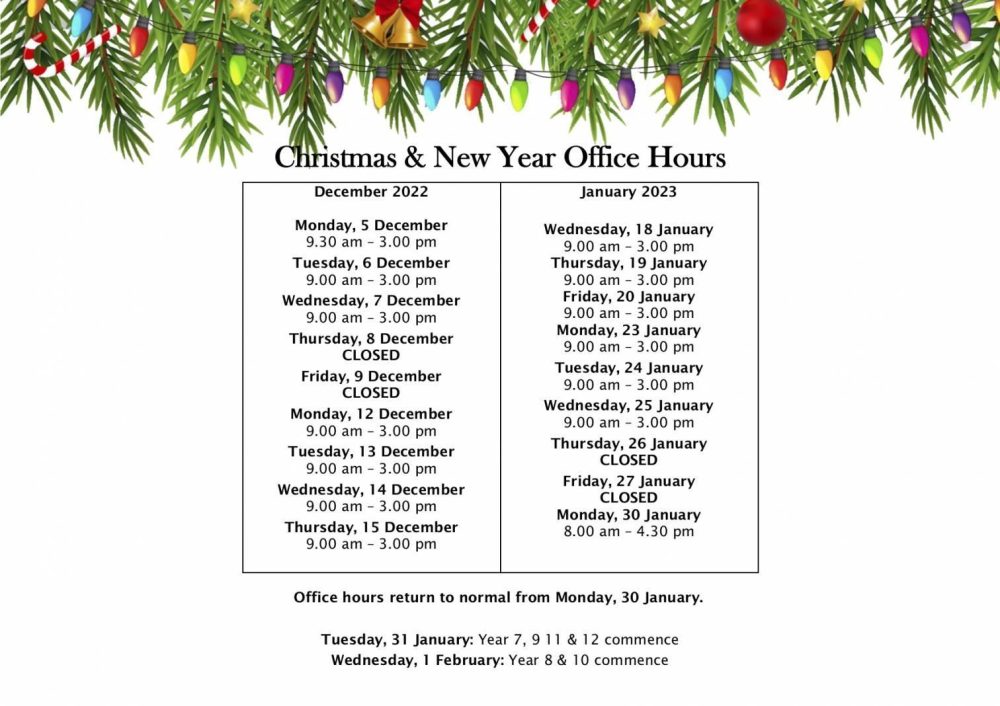
As of May 2020, the Uniform Shop will be operating by appointment only. This will help alleviate lengthy queues during peak periods.
With the phasing in of the new Sun-smart bucket hats next term, we will be selling the remaining stock of SBC baseball caps for $8 each. Please note that the caps will not be available to purchase from October onwards but students will still be permitted to wear them.
Click here to make an appointment
If you know the sizes of the items you require, visit https://shop.sbc.vic.edu.au/ to order online.
For all other uniform enquiries, or to volunteer in the uniform shop, please email rbuhagiar@sbc.vic.edu.au or phone 9289 1176.
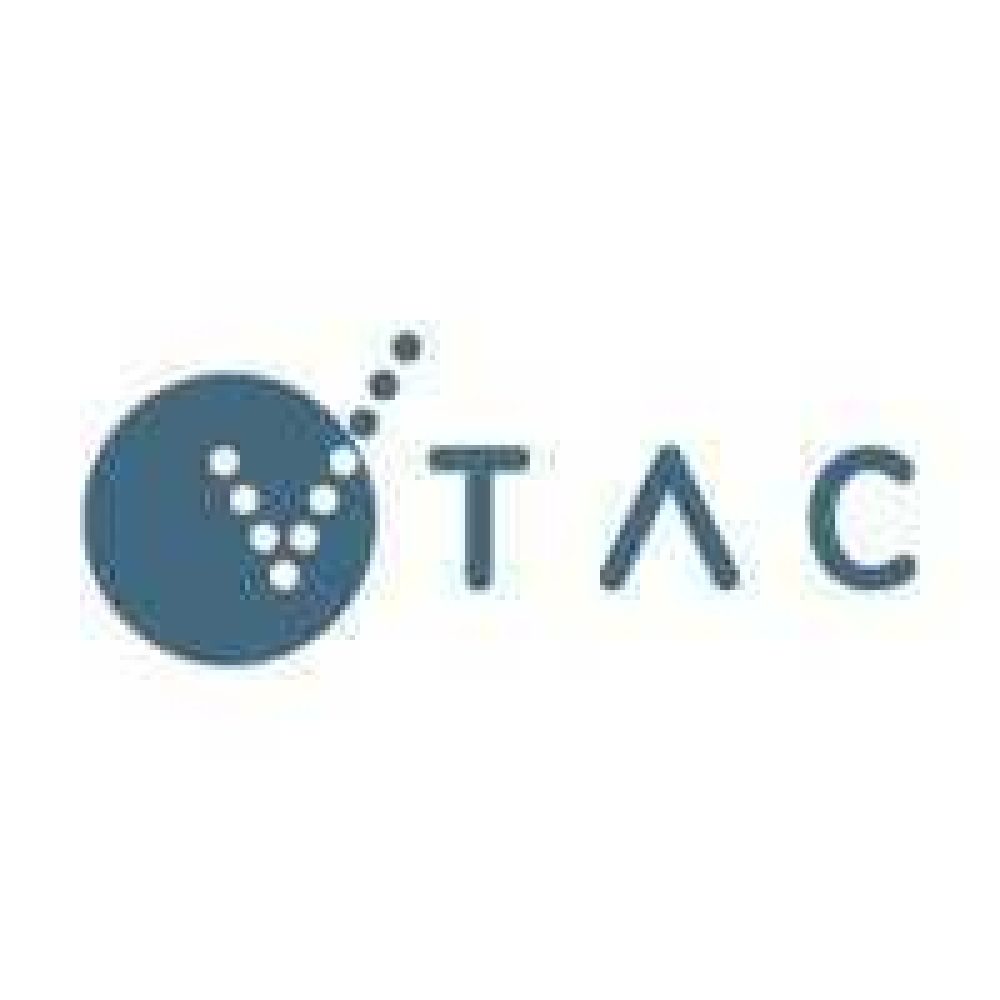 VTAC APPLICATIONS FOR TAFE and UNIVERSITY
VTAC APPLICATIONS FOR TAFE and UNIVERSITY
Following the last of seven VTAC application workshops, students are now ready to apply for their courses. We have strongly encouraged students that once they submit their preferences, to email myself or Ms Miles, to give us the chance to review their preferences.
‘The basics’:
-VTAC submission date 29 September.
-Students can change their preferences any number of times, between now and 29 September (no extra cost).
-ATAR release 12 December 7AM.
-Change of preference 12-14 December (careers will be available during this time, in case students need to change preferences after ATAR release)
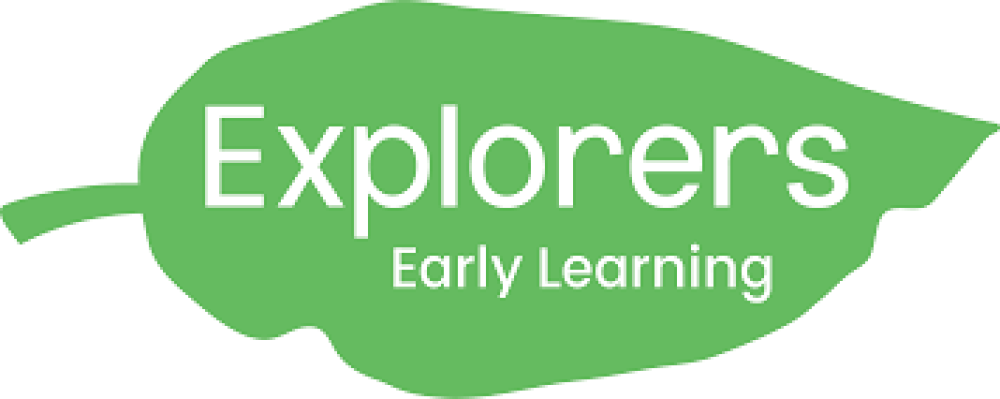
Considering teaching, but also considering a Gap Year? See: https://eel.com.au/traineeship/
Make sure to reach out if you need assistance with your application.
![]()
Access Melbourne
The Access Melbourne website has been updated with details about our recent changes for 2023 applicants, including details about our new First in family category and expanded eligibility for our Disadvantaged financial background category.
There are nine Access Melbourne categories, which correlate to VTAC's Special Entry Access Scheme (SEAS) categories. Domestic students can select all categories that are relevant to their circumstances as part of their SEAS application.
School-leaver SEAS/Access Melbourne applicants can receive guaranteed entry if they achieve the Guaranteed ATAR, satisfy course prerequisites and are eligible under one of these categories:
Disadvantaged financial background
Resident of a regional or remote area
Aboriginal and/or Torres Strait Islander.
The list of Victorian secondary schools determined to be under-represented for 2023 entry is now available on our website.
A Day At Melbourne
Year 9 and 10 students are invited to Parkville campus for a day of hands- on workshops, critical thinking and interactive seminars and campus and accommodation tours.
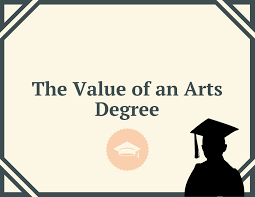
Where can an Arts Degree take you?
There is often the debate about the value of an Arts Degree and what kind of role an Arts graduate could find in industry. The list of roles is quite varied, and includes -
Teaching & educational administration
International aid and trade agencies
Arts production and management
Public service and social welfare agencies
General management and administration (local and global)
Communications industry, publishing, media, and public relations
Tourism and hospitality
One of the very important things for students to note, is that an Arts student learns skills that are very transferrable in industry. These include communication skills, critical thinking and reading skills, analytical skills, and research skills – browse Career FAQS - What to do with your Arts Degree to learn more. Monash University recently shared an excellent YouTube video about a Career with a Bachelor of Arts.

Studying the Bachelor of Applied Innovation alongside another Degree
Swinburne University is introducing the Bachelor of Applied Innovation to be studied in conjunction with a number of other degrees. With just one extra year, students get to graduate with a double degree.
Depending on the degree a student chooses to study alongside the Bachelor of Applied Innovation, various skills will be developed, including –
a student’s collaboration, creativity, and complex problem-solving skills in real-world contexts.
how to apply innovation toolkits, prototype solutions and participate in challenges such as innovation sprints inspired by their passions and interests.
gaining the practical and technical skills to think strategically about how to employ innovative ideas in their studies and in the broader society.
learning how to make decisions of impact, based on analytical and strategic thinking, human understanding, and respect for future generations – with supporting technological know-how.
undertaking placements, internships or industry-based project work, and benefit from interdisciplinary, experiential learning. Students will tap into their creativity, curiosity, and leadership potential as they gain the skills to build a better future.
The following double degrees including Applied Innovation are on offer. Students are encouraged to browse the links that provide more details about the core and major units on offer in the Applied Innovation degree as they do differ from double degree to double degree:
Bachelor of Business Information Systems/Bachelor of Applied Innovation
Bachelor of Criminal Justice and Criminology/Bachelor of Applied Innovation
Bachelor of Engineering (Honours)/Bachelor of Applied Innovation
Bachelor of Games and Interactivity/Bachelor of Applied Innovation
Bachelor of Information and Communication Technology/Bachelor of Applied Innovation
Bachelor of Media and Communication/Bachelor of Applied Innovation
Bachelor of Screen Production/Bachelor of Applied Innovation

What does a Forensic Psychologist do?
The Australian Psychological Society states that a Forensic Psychologist uses their legal and psychological knowledge to help individuals, government employees and organisations navigate the legal and criminal justice systems.
In court proceedings, Forensic Psychologists use scientifically based principles to assess a client, collect evidence that relates to the psychology of the person, and table a report, and the report is then used in evidence.
Forensic Psychologists would be utilized for areas that include child protection, family services, alcohol and other substance abuse, rehabilitation services (such as pain clinics or head injury services), and research.
Find out more at Forensic Psychology.

Physiotherapist, Chiropractor, Osteopath and Myotherapist
What is the difference? In November 2020 an article by Charlotte Ganderton and Matthew King was published on the ABC website addressing this very topic, and the fact that all four types of therapy come highly recommended to assist people in managing their aches and pains. To sum up the article –
In Australia, physiotherapists, osteopaths, and chiropractors have extensive university training and are registered with the Australian Health Practitioner Regulation Agency (AHPRA). Myotherapists complete an advanced diploma or bachelor’s degree in myotherapy or "musculoskeletal therapy” but are not registered with AHPRA.
The article goes on to state that a physiotherapist assesses your problem, provides a diagnosis, and helps you understand what's wrong while considering your general health, activities, and lifestyle. The physiotherapist treats your complaint with a variety of "active" therapies, such as exercise programs and hydrotherapy.
A chiropractor works on the diagnosis, treatment and prevention of mechanical disorders of the muscles, ligaments, tendons, bones and joints, and the effect on the nervous system.
They have an emphasis on passive manual treatments, including joint and soft-tissue manipulation, and spinal adjustments. They may also prescribe exercises to help you rehabilitate from your condition as well as provide dietary advice.
An osteopath focuses on the muscular and nervous systems, assessing the structure of the body to determine its impact on function. Treatment involves a combination of active and passive therapies, including joint manipulation and mobilisation, massage, as well as postural advice and exercise programs.
Finally, a myotherapist works to assist your aches and pains by focusing on the muscles and joints. They offer a range of mostly "hands-on" treatments including dry needling, massage, and joint mobilisation, but can also prescribe exercises.
Students can access the full article at Physiotherapist, chiropractor, osteopath and myotherapist: what's the difference and which one should I visit?

What does a Clinical Neuropsychologist do?
A clinical neuropsychologist specialises in the assessing and diagnosing of brain impairment and how this affects thinking skills, emotions, behaviour and personality. These specialists are also involved in the rehabilitation and management of the effects of brain impairment and often work with other health professionals.
To find out more about a career as a Clinical Neuropsychologist, visit Clinical Neuropsychologist.

Career in Veterinary Nursing
The Good Careers Guide * states that Veterinary Nurses provide support to veterinarians in the management and care of animals receiving medical and surgical treatment.
The Personal requirements for a Veterinary Nurse include -
Enjoying working with animals
Able to handle animals with confidence and patience
Able to make accurate observations
Having good communication skills
Having good organisational skills
Being able to work as part of a team
Being caring and understanding
Some of the tasks a Veterinary Nurse might have to do include –
Providing animal care advice, and preparing, delivering, and reviewing animal care education programs.
Assisting Veterinarians to administer anaesthetics and oxygen during operations.
Holding animals to allow examination and treatment by Veterinarians.
May act as receptionist, accept payments, and undertake clerical work.
Giving medications to animals.
Placing animals in cages for recovery from operations and monitoring their condition.
Maintaining stock control and records.
May perform diagnostic laboratory tests.
Preparing instruments and handing them to the Veterinarian.
Cleaning and sterilising examination tables and equipment.
* The Goods Careers Guide – Veterinary Nursing
Veterinary Nurses need to have a minimum of a Certificate IV in Veterinary Nursing, although qualifications can include diplomas and bachelor degrees. Some of these can be found at Box Hill Institute, Melbourne Polytechnic, and La Trobe University.

Accounting and Business Information Technology (Professional)
The Bachelor of Accounting and Business Information Technology (Professional) is a prestigious industry degree highly integrated with the real world to maximise your employment outcomes.
In this practical and hands-on course, students will:
Explore how people, information, computers, networks, and processes come together to create cohesive business solutions.
Learn how to use accounting systems to record and analyse business activities, prepare financial statements and management reports, and employ financial statements to guide investment decisions.
Understand how to use information from financial accounting systems to develop operating strategies and evaluate business performance.
Gain skills in designing, building, and implementing software solutions, analysing existing systems, and recommending solutions to address the information needs of organisations.
Leading Australian organisations are involved in the design of this course and in the professional development students. Industry partners include Deloitte, EY, NAB, PwC, Pitcher Partners, Siemens, Unico, and Viva Energy.
In the final year, there is a Business Information Systems Industry Project whereby students team up with other students to work on a real project briefed to them by an industry partner.
Find out more at Bachelor of Accounting and Business Information Technology (Professional).

Freight, Transport, and Logistics Industry
An industry that is continuing to grow is in transport and logistics. There are many careers in this diverse industry from actually driving a truck or train, to being part of the logistics team involved in the planning and distribution of freight and people. A particularly important part of this industry is in international freight – be it freight coming into Australia (imports) from all over the world, or cargo being sent from Australia (exports). People involved in this do not move the freight themselves, but instead act as an agent, connecting exporters, importers, and various transportation services like shipping, air freight, road transport, and rail.
An interesting website to visit is Make Your Move and students can also access videos of current students training in this industry.
There are two universities in Melbourne that offer dedicated logistic courses – RMIT and Victoria University. Students are encouraged to browse the following links providing more information about these courses:
Designed to help to develop a students’ knowledge and interest in contemporary issues central to the logistics and supply chain management industry. This unique degree prepares students for this essential industry, providing them with sought-after knowledge, and both hard and soft skills to allow them to thrive in a challenging and rewarding career. Throughout their studies, students will focus on developing end-to-end supply chain knowledge to deal with day-to-day and strategic supply chain issues.
Diploma of Logistics at RMIT
Designed to give students an understanding of key business areas while they develop specialist knowledge in transport and logistics planning, blockchain in supply chain management, and operations and risk management. This combination of skills, plus opportunities to engage in practical projects and collaborate globally with students and clients, will prepare students to move straight into the workforce after graduation, or to continue on into the bachelor degree.
Bachelor of Business (Supply Chain and Logistics Management) at Victoria University
Students enrol into the Bachelor of Business and study the Supply Chain and Logistics Management major. This major will enable students to pursue a business career in logistics and supply chain management, export/import operations. This major will also give students the skills to work closely with other companies in areas like manufacturing and services.
Logistics units/subjects are often offered in business degrees at universities.
Students are encouraged to browse VTAC for a comprehensive list of what is on offer across tertiary institutions in Victoria.
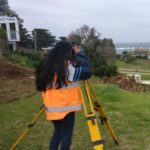
What is Land Surveying?
Interested in Geography, Maths, Science, IT and/or the outdoors? Looking for a job that won’t tie you to a desk? Surveying is the measurement and mapping of our surrounding environment using mathematics and specialised technology. Land surveyors are involved with a diverse variety of projects from land subdivision to tunnel building and major construction.
Importantly though, there is much more to surveying than taking measurements outdoors and then analysing them back in the office. Surveyors are often the first people on site during any construction process; they are the guardians of property law, and the creators of land titles. They are also the ones who can sign off on the position of new title boundaries. In all, surveyors are an integral part of the process in a wide variety of scenarios.
Students who wish to find out what surveying is, what surveyors do, where to study, and what it takes, might like to browse A Life Without Limits.
![]()
News from Victoria University
New Bachelor of Data Science
The Bachelor of Data Science has been designed for students with an interest in statistics, data analysis, machine learning and software development. The course has an industry-focused curriculum with a focus in practical expertise.
With market information and technology evolving at great speed, skilled professionals are needed to transform data into actionable insights for business. The Bachelor of Data Science is designed to meet this demand and give students the tools to analyse trends for business success, and launch a career perfectly aligned to industry needs.
Students will gain targeted expertise in:
mathematics and statistics
exploratory data analysis
machine learning
regression
classification
clustering techniques
text analytics
image and speech processing.
The VCE entry requirements are the completion of the VCE or equivalent, Units 3 and 4: a study score of at least 25 in English (EAL) or 20 in any other English, plus a study score of at least 20 in Mathematics (any).
Find out more about this course at Bachelor of Data Science.
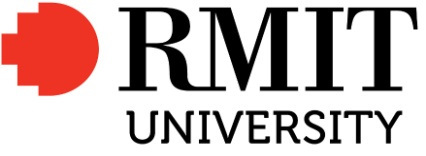
Studying Design Courses at RMIT
Whether you’re passionate about graphic or interior design, merchandising or animation, study at the #1 design university in Asia Pacific.
RMIT offers a range of courses for students who are creative, curious, and keen on studying the creative arts.
Students are encouraged to browse this link to find out about all that is on offer.
Qantas Engineering are offering an apprenticeship program at their hangar facility based at Melbourne Airport. In early 2023, they’re looking to take 15 apprentices to support their aircraft maintenance operations with the recruitment process likely to start around September this year. For more information on the types of apprentices available, please click here: https://www.qantas.com/au/en/about-us/qantas-careers/programs/apprenticeship-program.html
Interested? Click on link above to confirm application details and then notify me immediately if you would like assistance with your application.

Difference between a Bachelor of Laws and the Juris Doctor
The Good Universities Guide provides a useful summary of the many types of law degrees that one can study for in Australia. Two such courses are:
Bachelor of Laws (LLB) -
The Bachelor of Laws is typically a 4-year degree and is open to school leavers with a high enough ATAR (or equivalent) score. This undergraduate degree fulfills the academic side of qualifying for admission into legal practice.
Juris Doctor (JD) -
The Juris Doctor is a postgraduate degree that typically takes 3 years. It is equivalent to enrolling in a LLB as a graduate. The main advantage of a JD over a LLB is that programs are designed to suit graduate students. Students should note though, that the JD normally costs far more than the LLB as, apart from generally higher tuition fees, postgraduate status means students miss out on government financial concessions for undergraduate study.
Students are encouraged to browse Top Law Schools and Degrees in Australia to learn more.
![]()
New Bachelor of Criminology and Criminal Justice degree
The Thomas More Law School has introduced the Bachelor of Criminology and Criminal Justice.
Already proving popular with students in 2022, this course explores the causes of antisocial behaviour and develops the knowledge and expertise needed to make a valuable contribution in the criminal justice sector. Students gain a deep understanding of the complex causes and impact of crime, and the legal and social policies that keep society safe. The degree includes studies in forensic psychology, forensic science, cybercrime, border protection and biosecurity and understanding violence and trauma. All criminology students also undertake a community engagement in the third year of the course.
Find out more at Bachelor of Criminology and Criminal Justice.

Career as a Paramedic
Deciding to become a paramedic is a life-changing decision. For many the first decision they want to make is to decide what type of paramedic training they need.
Being a paramedic is about a lot more than lights and sirens and rushing to help someone in need. Paramedics perform clinical procedures, administer drugs, maintain patient records and decide the most appropriate medical facility to take someone to.
There are different types of paramedics – visit Types of Paramedics.
To find out more about being a paramedic in Victoria, browse the Ambulance Victoria website at Paramedics.
